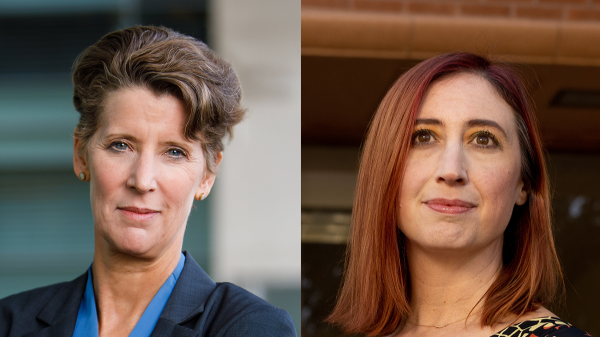International travel, research highlights of December grad’s ASU experience

Piper Heiligenstein, courtesy photo
Editor's note: This story is part of a series of profiles of notable fall 2023 graduates.
Piper Heiligenstein’s undergraduate experience at Arizona State University was a combination of academics, adventure, prestigious research opportunities and personal autonomy.
Heiligenstein will graduate in December with a bachelor’s degree in biological sciences from The College of Liberal Arts and Sciences, a certificate in biomedical research from the New College of Interdisciplinary Arts and Sciences and honors from Barrett, The Honors College at ASU.
She took her first-ever international trip to Germany as the recipient of the DAAD RISE scholarship in the summer of 2022, where she was an intern at Kiel University working as a laboratory research assistant all week and traveling to neighboring countries on weekends.
“The most interesting moment in my ASU career was in the summer of 2022 when I traveled and lived across the ocean by myself for a summer for the DAAD RISE scholarship,” said Heiligenstein, who is from Trenton, Illinois.
“It was so interesting for me since it was my first time traveling and living alone out of the country. The experience really challenged me in terms of independence, but I was able to meet some really cool people who I still keep in touch with today,” she said.
Heiligenstein followed up her experience in Germany with the Fulbright-MITACS Globalink Research Internship program over the summer of 2023 at McGill University, an English-language public research university located in Montreal, Quebec, Canada, where she spent 12 weeks studying genomics and DNA replication.
As a Barrett student, she completed an honors thesis titled “Deciphering the Essentiality of the Mycobacterium smegmatis PrrAB Two Component System.”
“I believe completing an honors thesis is a huge advantage on graduate school applications. The undergraduate honors thesis process gave me insight into how my future thesis defense process might look like and I also think showing you have tangible experience presenting and defending your own independent work is a key thing graduate admission offices look for,” said Heiligenstein, who plans to pursue a PhD in biomedical sciences with a focus on infectious diseases.
As Heiligenstein, who was an ASU President’s Scholar, wraps up her last undergraduate semester, we asked her to reflect on her time at ASU. Here’s what she had to say.
Question: What was your “aha” moment when you realized you wanted to study the field you majored in?
Answer: There was really no exact moment when I decided to study biological sciences, but I always enjoyed my biology classes in high school the most out of all my classes.
Q: Why did you choose ASU?
A: I chose Arizona State since I wanted to escape the Midwest cold weather and my father graduated from ASU with a bachelor’s degree in English back in 1988.
Q: Why did you choose to be in Barrett Honors College?
A: After I got accepted into Arizona State, I took a tour of the campus and met with then-Barrett Honors College Dean Mark Jacobs. I was really impressed by the college and the guidance and resources the school provided students.
Being a Barrett student enhanced my undergraduate experience by making a massive university feel a lot more like home. I'm from a pretty small town, and Barrett had a community atmosphere I would have missed if I did not join the college. I met almost all of my friends through Barrett.
Q: Which professor taught you the most important lesson while at ASU? What was that lesson?
A: The professor at ASU that taught me the most important lesson is Dr. Susan Holechek, assistant teaching professor in the School of Life Sciences. She taught me that genetics is more than just studying pea plants and inheritance, which led me to working in a microbiology/genetics lab.
Q: What’s the best piece of advice you’d give to those still in school?
A: The best piece of advice I can give to those still in school is don’t be too hard on yourself because everyone around you is just figuring it out as they go as well.
Q: What was your favorite spot on campus, whether for studying, meeting friends or just thinking about life?
A: The Sun Devil Fitness Complex is my favorite spot on campus because I used to work at Shake Smart and I played intramural volleyball for three years.
Q: If someone gave you $40 million to solve one problem on our planet, what would you tackle?
A: If someone gave me $40 million to solve one problem, I would create a nonprofit organization with the purpose of tackling antibiotic resistance, specifically through funding projects related to phage therapy and antibiotic residue in water supplies.
More University news

2 ASU faculty members elected to prestigious National Academy of Medicine
Two distinguished Arizona State University faculty members have been elected to the National Academy of Medicine.Sally C.…

ASU establishes Center for Free Speech, will host annual free speech forum
Arizona State University is establishing a new Center for Free Speech to encourage the uninhibited exchange of ideas, and the…

Public affairs professor, back at ASU after 3 years with NSF, is named Sackton Chair
After three years at the National Science Foundation, Professor Mary Feeney has returned to Arizona State University, where she…